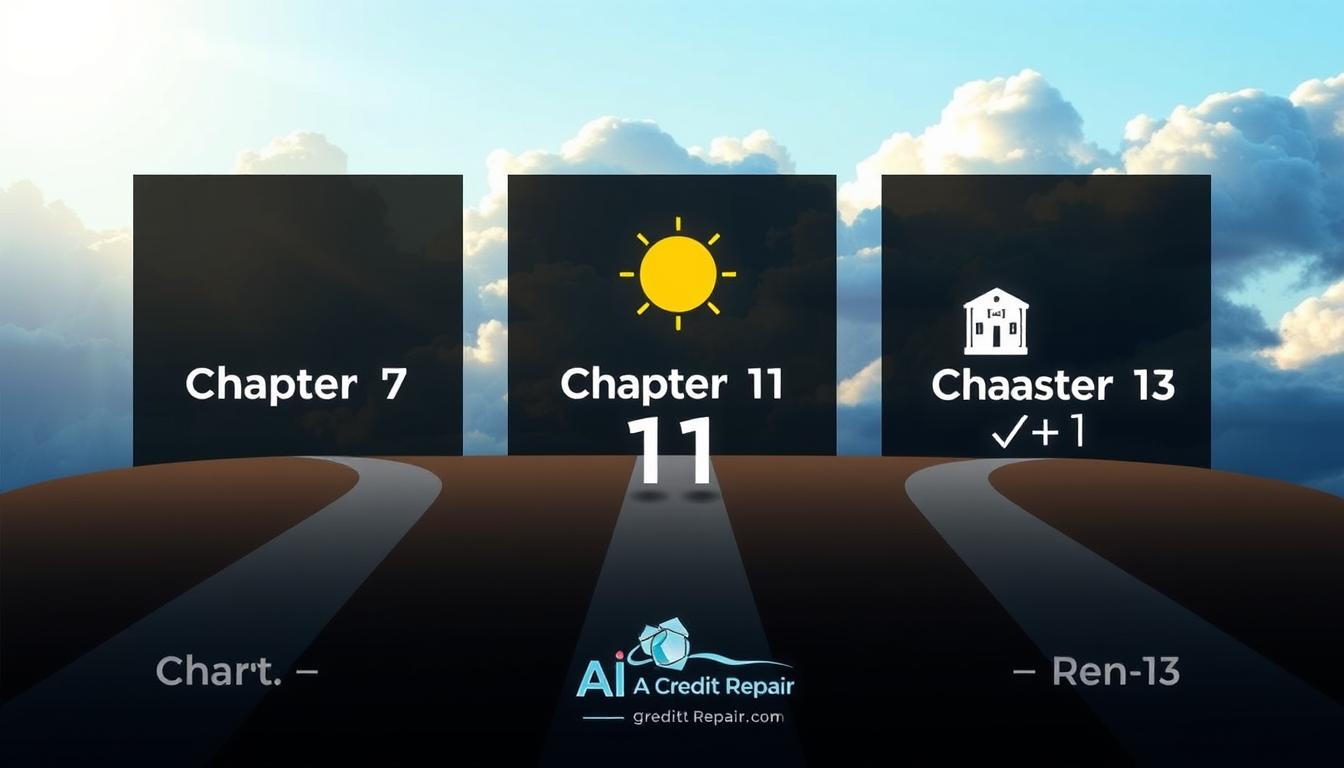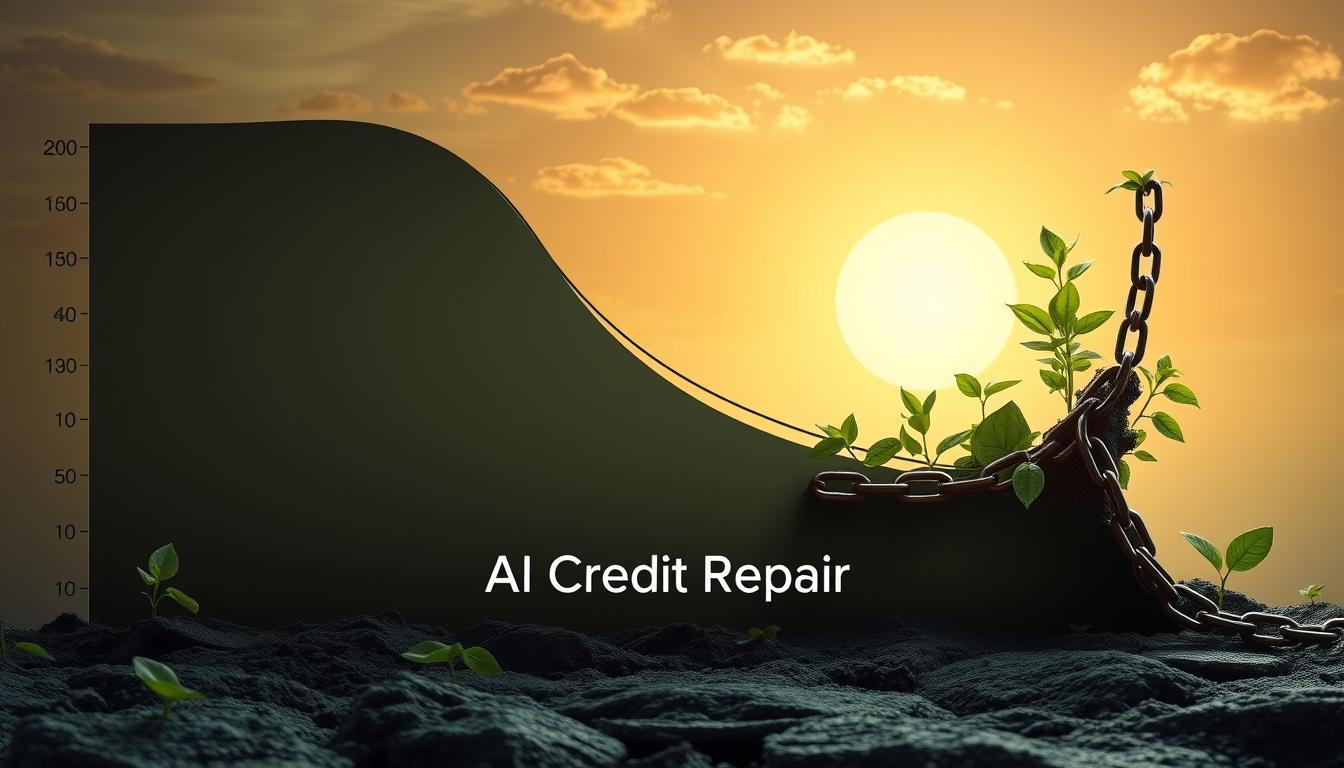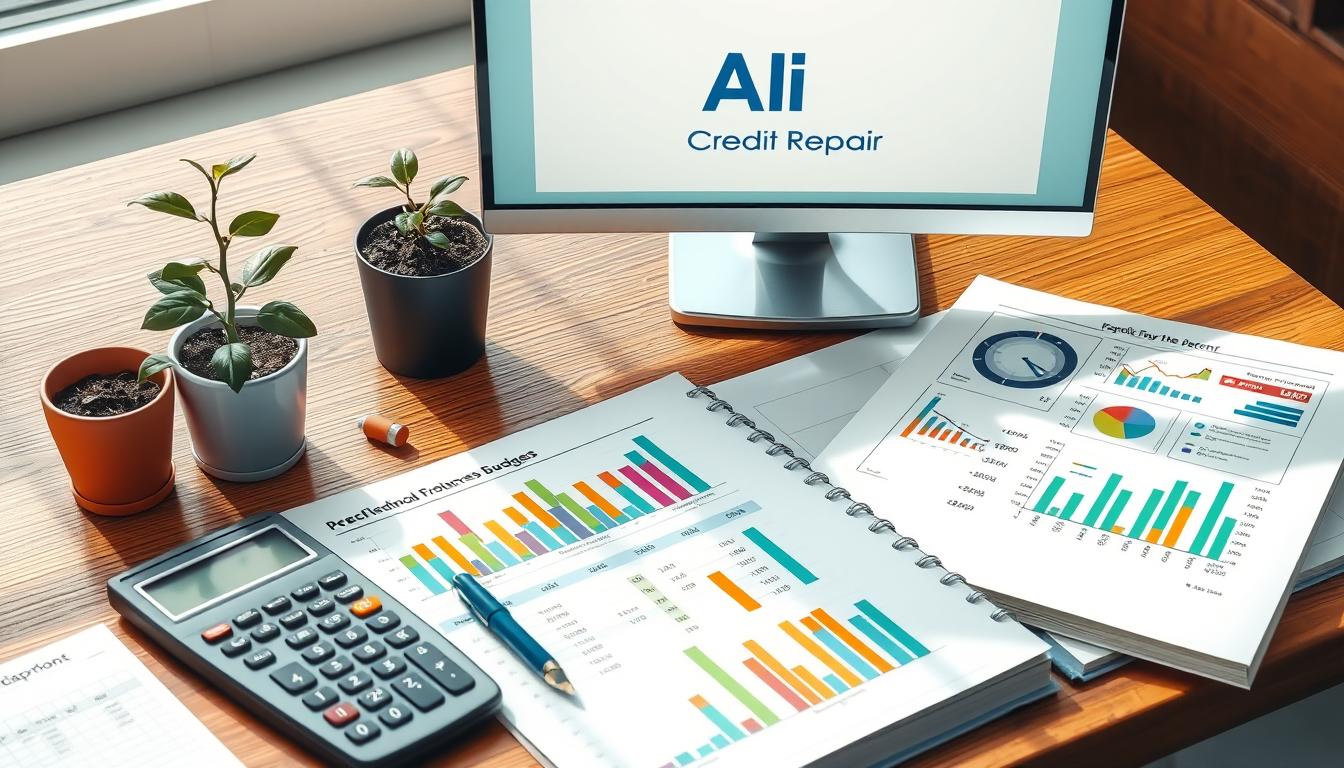Bankruptcy can greatly affect your credit score. The impact varies based on several factors. Understanding how bankruptcy influences your credit is vital for future financial decisions.
This article explores bankruptcy’s effects on credit. We’ll look at different types of bankruptcy. We’ll also discuss steps to rebuild your credit after the process.
Key Takeaways
- Bankruptcy can significantly lower your credit score, sometimes by 100 points or more.
- The type of bankruptcy you file (Chapter 7 or Chapter 13) can affect the duration and severity of the impact on your credit score.
- Rebuilding your credit after bankruptcy takes time, but it is possible through strategies like obtaining a secured credit card and becoming an authorized user on someone else’s account.
- Monitoring your credit report and disputing any errors can help improve your credit score after bankruptcy.
- Avoiding future financial pitfalls, such as creating a budget and building an emergency fund, can help prevent the need for bankruptcy in the long run.
Understanding Credit Scores and Bankruptcy
Credit scores are vital financial indicators used by lenders. They assess an individual’s creditworthiness based on their credit history and payment patterns. Bankruptcy can severely impact credit scores, being one of the most negative events on a credit report.
How Credit Scores are Calculated
Credit scores use complex algorithms considering several key factors. These include payment history, credit utilization, and length of credit history. Major credit bureaus use proprietary formulas to calculate scores.
Payment history and credit utilization are generally the most important components. These factors heavily influence the final credit score calculation.
The Impact of Bankruptcy on Credit Scores
Bankruptcy filing is recorded on credit reports, causing a severe, long-lasting impact. It often results in a significant drop, sometimes by 100 points or more.
This drop makes obtaining credit, securing favorable interest rates, or renting apartments much harder. The effects can be felt long after the bankruptcy is resolved.
The duration of bankruptcy on credit reports varies by type. Chapter 7 can remain for up to 10 years. Chapter 13 can stay for up to 7 years.
“Bankruptcy is a last resort for individuals who are struggling with overwhelming debt. While it can have a significant impact on one’s credit score, it is important to understand the long-term implications and explore all available options before filing.”
Types of Bankruptcy and Their Effects
Chapter 7 and Chapter 13 are the most common types of bankruptcy. Your choice can greatly affect your credit score and financial recovery time.
Chapter 7 Bankruptcy
Chapter 7 bankruptcy is often called “liquidation bankruptcy.” It involves selling your non-exempt assets to pay creditors. This can remain on your credit report for up to 10 years.
Chapter 7 can severely impact your credit score for a long time. Getting new credit, loans, or rental housing may become more challenging.
However, Chapter 7 can offer a fresh start. It discharges most eligible debts, easing financial burdens. This allows you to begin rebuilding your credit.

“The decision to file for bankruptcy is a personal one, and it’s important to understand the potential consequences before taking that step.”
Factors Affecting Credit Score After Bankruptcy
Rebuilding your credit score after bankruptcy takes time. Understanding key factors that influence your creditworthiness is vital. Two crucial elements shape your credit score post-bankruptcy: time since discharge and new credit history.
Length of Time Since Bankruptcy
A bankruptcy’s impact on your credit score lessens over time. The longer since discharge, the less it affects your creditworthiness. Bankruptcy can stay on your credit report for up to 10 years.
However, its negative impact on your score will decrease each year. This gradual improvement can help you regain financial stability.
New Credit History
Building a positive new credit history is crucial for factors affecting credit score after bankruptcy. Acquire new credit through secured cards or becoming an authorized user.
These steps show your ability to manage credit responsibly. Consistent on-time payments and responsible credit use are key to building credit after bankruptcy.
By understanding these factors and taking action, you can improve your financial standing. With time and effort, you’ll achieve a higher credit score after bankruptcy.
What Will My Credit Score Be After Bankruptcy?
Your post-bankruptcy credit score depends on several factors. These include your credit history, bankruptcy type, and credit rebuilding efforts. Typically, credit scores drop significantly after bankruptcy but can improve over time.
The impact on your score varies based on your unique financial situation. Key factors affecting your post-bankruptcy credit score include:
- The type of bankruptcy (Chapter 7 or Chapter 13)
- Your credit history before the bankruptcy
- How quickly you begin rebuilding your credit
- Your payment history and utilization of new credit
The effect of bankruptcy on your credit score lessens over time. As you build positive credit history, your score can improve. It may even reach pre-bankruptcy levels within a few years.
| Credit Score Range | Bankruptcy Impact |
|---|---|
| Excellent (800-850) | Significant drop, often to the 500s or 600s |
| Good (700-799) | Significant drop, often to the 500s or 600s |
| Fair (600-699) | Moderate drop, often to the 400s or 500s |
| Poor (500-599) | Minimal impact, as the score is already low |
Your post-bankruptcy credit score is unique to your situation. With diligence and responsible financial management, you can rebuild your credit. You can achieve your financial goals with time and effort.

Rebuilding Credit After Bankruptcy
Rebuilding credit after bankruptcy may seem tough. But with the right approach, you can improve your credit score. A secured credit card and becoming an authorized user are effective strategies.
Obtain a Secured Credit Card
A secured credit card requires a refundable deposit. This deposit becomes your credit limit. It helps those with poor credit establish a new positive history.
Timely payments on a secured card show responsible credit management. This can help you start rebuilding your how to rebuild credit after bankruptcy.
Become an Authorized User
Another option is becoming an authorized user on someone else’s card. You’re added to the account, and its history appears on your credit report.
Choose an account holder with on-time payments and low credit use. This can boost your own secured credit card after bankruptcy.
Combining these strategies helps rebuild credit gradually. It takes time and patience. But with effort, you can overcome bankruptcy and regain financial stability.
Monitoring Your Credit Score
After bankruptcy, keep a close eye on your credit score. It’s vital for your financial health. Understanding how to improve it is key to your long-term success.
Disputing Errors on Credit Reports
Mistakes on your credit report can hurt your score, even post-bankruptcy. Check your reports from Experian, Equifax, and TransUnion regularly. Look for and dispute any errors you find.
Watch for accounts that should be gone or wrong payment histories. You can challenge these directly with the credit bureaus. Gather proof, write a dispute, and follow up until it’s fixed.
Fixing these issues helps in monitoring credit score after bankruptcy. It ensures your report shows your true financial status.
- Obtain copies of your credit reports from all three major credit bureaus.
- Carefully review each report for any inaccuracies or errors.
- Gather supporting documentation, such as payment records or bankruptcy documents.
- Submit a written dispute to the credit bureau(s) detailing the errors and providing evidence.
- Follow up with the credit bureau(s) until the issues are resolved and your credit report is updated.
Disputing errors on credit report after bankruptcy is crucial. It helps your score reflect your true financial situation. This step is key to rebuilding your creditworthiness.
“Regularly monitoring your credit report and disputing any errors is crucial for maintaining a healthy credit profile after bankruptcy.”
The Importance of Good Credit
A strong credit score can greatly impact your financial well-being. It affects your access to loans, credit cards, and even housing opportunities. Understanding its importance is crucial for financial success.
Your credit score influences how lenders, landlords, and employers view you. A high score can lead to better loan terms and lower interest rates. It also improves your chances of getting credit cards and mortgages.
A poor credit score can make these financial services hard to get. It might even affect your job prospects or ability to rent a home. That’s why maintaining good credit is so important.
Rebuilding credit after bankruptcy should be your top priority. Bankruptcy can stay on your credit report for up to 10 years. However, with effort, you can improve your score over time.
| Importance of Good Credit | Impact on Bankruptcy |
|---|---|
| Secures favorable loan terms and interest rates | Rebuilding credit score is crucial after bankruptcy |
| Grants access to credit cards, mortgages, and other financial products | Bankruptcy can remain on credit report for up to 10 years |
| Influences employment and housing opportunities | Diligent effort can gradually improve credit score over time |
Taking steps to rebuild your credit after bankruptcy is essential. It helps you regain financial stability and opens up future possibilities. Your efforts can lead to a brighter financial future.
“A good credit score is like a key that unlocks the door to financial opportunities. It’s a powerful tool that can transform your life.”
Avoiding Future Financial Pitfalls
After bankruptcy, it’s vital to prevent future money troubles. Two key strategies are creating a budget and building an emergency fund. These steps can help you regain financial stability.
Creating a Budget
A realistic budget is crucial for managing finances post-bankruptcy. Track your income and expenses carefully. Allocate funds for necessities, debt payments, and savings.
A detailed budget helps you control spending. It ensures you’re not falling back into avoiding future financial problems after bankruptcy.
Building an Emergency Fund
Unexpected costs can derail your progress, even after bankruptcy. Building an emergency fund after bankruptcy should be your top priority. Aim to save three to six months’ worth of living expenses.
Keep this money in a dedicated savings account. This cushion helps you handle surprises without resorting to creating a budget after bankruptcy.
These strategies help you avoid future financial problems. They also maintain long-term stability. A little planning now goes a long way in securing your financial future.

“Budgeting and saving are the keys to financial stability, even after a bankruptcy. With a solid plan in place, you can confidently move forward and avoid future financial pitfalls.”
Seeking Professional Guidance
Rebuilding credit after bankruptcy can be tough. Professional help can make a big difference. Credit counseling and financial advisory services offer valuable insights and personalized guidance.
Credit counselors assess your financial situation and offer advice on rebuilding strategies. They help develop plans to improve your credit score. They also guide you in managing debt and creating budgets.
Financial advisors help create comprehensive plans for saving, investing, and protecting assets. They identify underlying issues that led to bankruptcy. Their expertise ensures you’re better equipped for future financial stability.
Professional guidance is crucial for financial recovery after bankruptcy. With expert support, you can develop a clear roadmap. This helps in rebuilding credit and achieving financial goals.
Key Benefits of Seeking Professional Help
- Personalized guidance on credit rebuilding strategies
- Assistance in managing debt and creating a budget
- Identification and resolution of underlying financial issues
- Development of a comprehensive financial plan for the future
Financial recovery after bankruptcy isn’t always easy. But with the right support, you can overcome challenges. You can regain control of your financial future.
| Service | Benefits |
|---|---|
| Credit Counseling |
|
| Financial Advising |
|
Seeking professional help after bankruptcy is a smart move. It’s the first step towards a brighter financial future. You can regain control of your credit and overall financial well-being.
Bankruptcy Alternatives
Filing for bankruptcy is a major decision. It’s important to explore other options first. Debt consolidation and debt settlement are two popular alternatives.
Debt Consolidation
Debt consolidation combines multiple debts into one loan. This loan usually has a lower interest rate. It can make monthly payments easier and save you money.
Consolidating debts may help you negotiate better terms with creditors. This can make paying off your debts more manageable.
Debt Settlement
Debt settlement lets you negotiate with creditors to reduce your total debt. Often, a third-party company handles these negotiations for you. The goal is to settle for less than the original amount owed.
While debt settlement can provide quick relief, it has drawbacks. It may negatively impact your credit score. Consider the long-term effects carefully.
These alternatives to bankruptcy can help resolve financial issues. They may have less impact on your credit history than bankruptcy. Research your options thoroughly to find the best solution for you.

Conclusion
Dealing with credit scores and bankruptcy can be tough. But with the right knowledge, you can recover financially. Understanding bankruptcy types and credit score factors helps you rebuild your creditworthiness.
Financial stability after bankruptcy takes time and effort. The rewards are worth it, though. You can improve your credit score gradually with smart strategies.
Getting a secured credit card is one helpful step. Becoming an authorized user on someone else’s account can also boost your score. Regular credit report checks are crucial too.
Professional guidance can be incredibly valuable. It offers personalized advice and support during your recovery journey.
Bankruptcy impacts your credit score heavily. But it’s not the end of your financial story. You can bounce back and regain a good credit score.
With persistence, you’ll open doors to new financial opportunities. Remember, your path to recovery starts with small, consistent steps.

